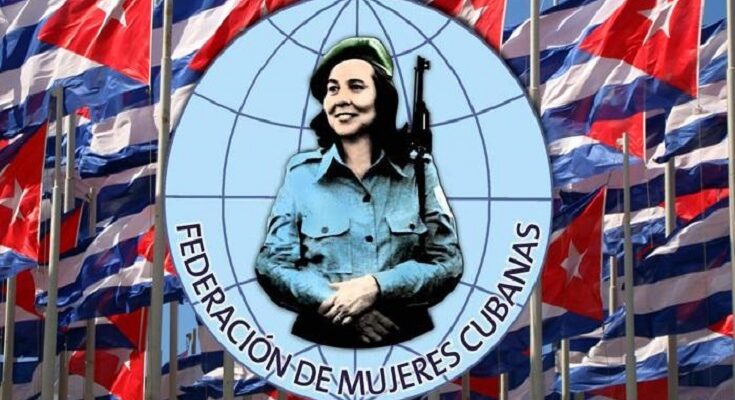Before 1959, Cuban women were subjected to innumerable forms of discrimination; some of the laws did not even mention them and those that did were purely formalistic, since their rights were very limited. As a result of unemployment and low salaries, women were forced to perform the most unlikely jobs. Few women were able to work in industry, and those who did were protected by a limited number of social laws. The vast majority of women worked as domestic servants and agricultural laborers, and were deprived of any kind of social insurance; indeed, the labor laws in force did not benefit them in any way. On the other hand, thousands were led down the atrocious and merciless path of prostitution.
Therefore, it was necessary to create an organization to promote equal rights and opportunities for women, and thus the Federation of Cuban Women, FMC, was created on August 23, 1960, by the will of Cuban women to initiate, paraphrasing Espín (1972), a radical change in women, transforming the mentality of men, establishing new values and overcoming prejudices.
The leader of the Cuban Revolution, Fidel Fidel, emphasized the importance of the event, stating: “Cuban women, doubly humiliated and relegated by the semicolonial society, needed their own organization to represent their specific interests and work to achieve their broadest participation in the economic, political and social life of the Revolution”.
The women’s organization, from its beginnings, had structures that have made it possible to materialize community actions towards the families, included in its Statutes: the blocks: the delegations, the social workers and the health brigadistas. The block is an intermediate structure between the delegation and the municipality, which brings together and manages the number of delegations necessary and possible for its operation. It was created with the objective of facilitating the work of the Municipal Committee to provide adequate and systematic attention to its delegations, in order to direct, coordinate and control the activities of the FMC in its demarcation.
For their part, the delegations are the primary base organizations, the starting point for the integral work of the FMC. Among their lines of work are the characterization of the needs, interests and problems existing in the territory they cover and the peculiarities of the women, families and other people residing there.
The realization of its objectives is deployed through the sphere of community work, which, in turn, has four fundamental areas of work: social work, health, education and women’s and family homes. Its specific functions and activities are related to the reduction of social problems affecting women and the family, the promotion of the school-family relationship (Fathers’ Schools, Mothers’ and Fathers’ Movement), activities programmed by the Women’s and Family Guidance Houses in the communities, and other existing ways to contribute to improving family coexistence, the exercise of responsible maternity and paternity and, thus, a better influence of the family in the formation of new generations.
It also promotes the solution of women’s and family health problems, with the aim of achieving a more conscious participation of all of them in the actions that are developed.
Limited fundamentally to the role of housewife in charge of domestic tasks, subjected to the omnipotence of her husband, the first victim of the illiteracy that plagued a large part of the population, the outlook for Cuban women was rather bleak. Thus, of the 5.8 million inhabitants, with a schooling rate of only 55% for children between 6 and 14 years of age, more than one million children had no access to school and remained in the family home, under the mother’s care. Illiteracy hit 22 % of the population, or more than 800 000 people, mostly women (Perez 2015).
With respect to families, due to the macro-social way in which the Cuban Revolution projected actions (measures, programs, policies) towards the population in general and family members in particular, a single social actor dealing with the family in its integrality was neither conceived nor instituted. State responsibilities towards this institution, specifically towards its members, were assigned to institutions, ministries, etc., which for various reasons – direct assignment or because within their objectives and tasks, the family constituted an obligatory reference for the implementation of social actions – assumed tasks that were intrinsically State tasks.
Since the founding of the organization, through its responsibilities in the promotion of gender equity and women’s participation in the various economic, political, social and cultural spheres of the country, it has proposed goals that it has transferred to its practical actions related to families. The fact that it constitutes research evidence that the FMC has assumed an important role in attending to families, when its specific social task was directed towards one of the members of the family, women and their problems, does not mean that it is considered that this strengthens the sexist myth that the family is a matter that concerns women par excellence.

